In Kashmir, a year of misery
Al Jazeera profiles five Kashmiris whose lives have been adversely affected by the revocation of autonomy.
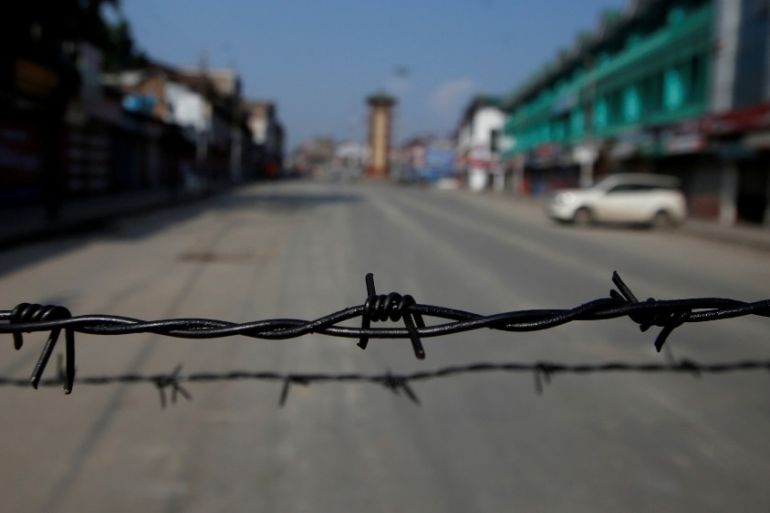
Budgam, Indian-administered Kashmir – On August 5, 2019, India stripped Indian-administered Kashmir of its limited autonomy saying the unprecedented move was meant to integrate the Muslim-majority region into India to bring “development” and end violence.
For six months, the Himalayan region faced an internet blackout and security lockdown that adversely affected the Kashmir Valley’s nearly eight million people. Thousands of politicians and activists were jailed, some of whom have since been released.
The region’s economy was devastated while schools and colleges were shut, many of them emptied out to accommodate Indian soldiers.
Activists have accused Indian authorities of using draconian laws to stifle dissent and committing human rights abuses against Kashmiris.
One year on, there is palpable anger against the government’s move to abrogate Article 370 of the constitution that granted the Muslim-majority region a measure of autonomy.
But the spokesperson of the governing Bharatiya Janata Party (BJP) in Indian-administered Kashmir, Ashok Koul, refuted such allegations and said Article 370 was removed to “bring progress and development in Kashmir”.
Al Jazeera profiles five Kashmiris whose lives have been adversely affected by last year’s decision.
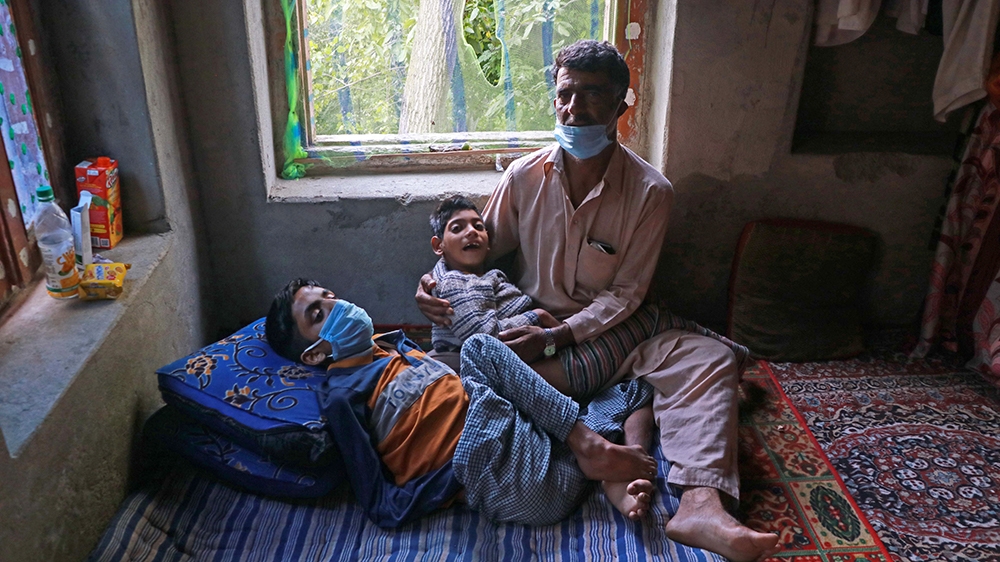
‘An unfortunate father’
The months of curfews last year meant transport services came to a halt in Kashmir. Nazir Ahmad Sheikh, who worked as a bus conductor for decades, was rendered jobless as hundreds of passenger vehicles were barred, creating a dire situation for the families dependent on the industry.
With a daily income of 300-500 rupees ($4-6.6), the 45-year-old from central Budgam district barely managed to make ends meet. He was the sole breadwinner for the family which includes his wife and three children aged 5-11. His oldest son is paralysed.
As businesses gradually started to reopen earlier this year, new restrictions were imposed due to the coronavirus pandemic, burying any remnants of hope for Sheikh, who had no option but to beg to be able to feed his family.
He sought his wife’s permission. “I knew I had no other option,” Sheikh told Al Jazeera.
“I was without work for so many months and I had to find a way to feed my family. I thought I had two options either to become a thief or to beg. I chose the latter,” he told Al Jazeera at his house in Sholipora village in Budgam.
“I am an unfortunate father,” he said with tears in his eyes. “I just wanted to educate my children and provide two meals to my family but in this situation, I am not able to do anything, I am feeling extremely helpless.”
To save his family from shame, Sheikh decided to travel to the nearby district of Srinagar, the main city in the Kashmir region, to beg. Sheikh began sitting on roadsides where he would carry his young paralysed son in his arms.
According to the Kashmir Transporters Welfare Association, the lockdown affected nearly 150,000 people associated with the transport sector.
Kashmir Chamber of Commerce and Industry (KCCI), a local body of industrialists in the region, has put the preliminary amount of losses to $5.3bn from last year’s lockdown. The traders’ body also said about half a million jobs had been lost since August last year.
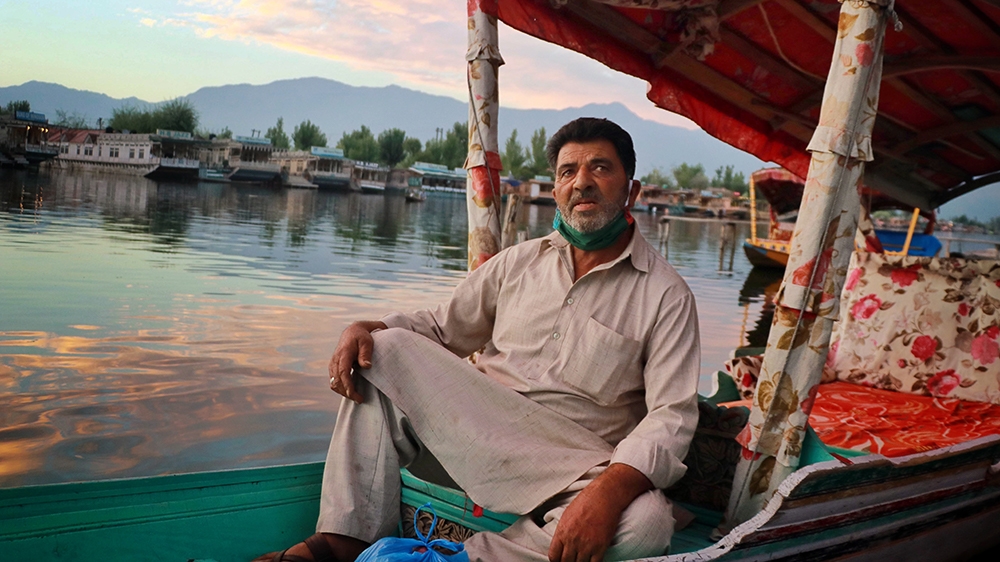
‘A long wait’
All his life, Abdul Majeed has followed a dedicated routine – he would leave home in the morning to row his boat on the famous Dal lake where he would take tourists on joyrides.
During the last 12 months, Majeed stayed loyal to his routine but earned nothing as the security lockdown forced tourists from the picturesque region.
“Last year, on August 3, we were towing our boats and there were hundreds of tourists. But suddenly, police came and started taking away tourists to the airport,” Majeed, 45, told Al Jazeera.
Every tourist was made to leave and hotels were emptied as the Indian government was preparing to impose the unprecedented lockdown.
“We watched helplessly whatever was happening. We could not question anyone.”
One year on, tourists have not returned and that has paralysed the region’s tourism industry which provided jobs to thousands of people.
Srinagar was turned into a ghost town immediately after the lockdown was announced. “We were in shock. That’s the last time we had some work,” Majeed told Al Jazeera.
Majeed has three children and a wife to feed. Without work, he feels frustrated and restless.
“From my childhood, I have been doing this work and I never felt this much anxiety,” he said, adding that even at the peak of the armed rebellion against Indian rule in the 1990s, things were not as bad as it is now. “I avoid going to my home because I cannot afford to buy most things that my wife asks me to buy,” he said. Majeed says he just tries to “find an escape”.
“I am sure if this deprivation of our work continues we will all be facing psychiatric issues. It seems we will have to sell everything ultimately.”
The tourism sector contributes nearly 6.92 percent to the region’s gross domestic product (GDP), according to the government economic survey.
“In this situation, we do not even feel that we have anyone to listen us like a politician or a leader. We are feeling abandoned by everyone. There is no one to hear us,” he said.
“We have completely submitted our fate to Allah.”
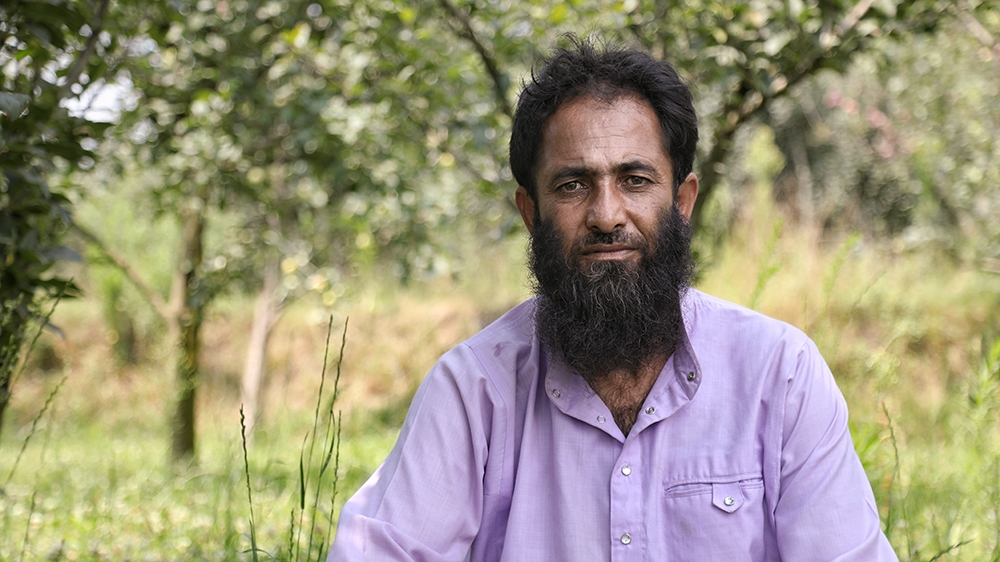
Apples turn sour
The horticulture industry is one of the pillars of Kashmir’s rural economy and apples remain the jewel of this industry. For Javaid Ahmad Ganai, an apple farmer, life has not been the same since last year.
A resident of south Kashmir’s Tahab village, Ganai said farmers like him are “now taking loans and keeping their land on mortgage to run homes”.
“Last year, after the lockdown, we were not able to sell our produce. Most of it either rotted on the trees or in the vehicles or fruit mandis,” said the father of four.
Ganai said the government last year announced measures to help farmers sell their produce at “good rates” but on the ground, the reality was different.
“I sent my first 50 apple boxes and was paid money for them,” Ganai said. “When I sent the second lot of 250 boxes, I was told that they could not find a buyer and I was never paid for it.”
The 44-year-old said before the lockdown he used to earn at least $300 a month. “It would help me feed my family of six which includes my three sons, a daughter and wife. I could also fund for the education of my children,” he said.
“The income is completely lost. The only way left is loans or selling my own property or trees to help feed my family. In the villages it is the same situation for everyone.
“It is just on the mercy of Allah that we are surviving. But I fear to think about the future. I don’t even go to my orchards now, it causes anxiety.”
Horticulture contributes nearly 5,000 crore rupees ($666,000) annually to the region’s economy. Nearly 3.3 million people in the region are directly or indirectly associated with horticulture, according to government figures.
Last year’s lockdown had coincided with the harvest season, with one farmer describing it as “one of the finest crops he has seen in his lifetime”.
Ganai says they will have to bear the consequences of the lockdown for many years to come.
“We are not able to maintain our orchards. We could not take care of the trees like buying fertilisers on time because we had no resources,” Ganai said. “This time 50 percent of the produce on trees has a disease and we can already see our economy for the next many years in shambles.”
At home, Ganai said he has no answers to his children’s demands. He said the only option available before him is taking loans but he fears that he might have to mortgage his land.
“In my village, more than 90 percent growers are taking loans. I know most of us cannot repay (the loans) and we will have to surrender our land,” he said, referring to a general sentiment in the region that New Delhi wants to bring about demographic changes by allowing Indians to buy land there.
“I think it’s a deliberate policy to push us towards giving away land. They know we are very helpless and they are making these loans easy for us.”
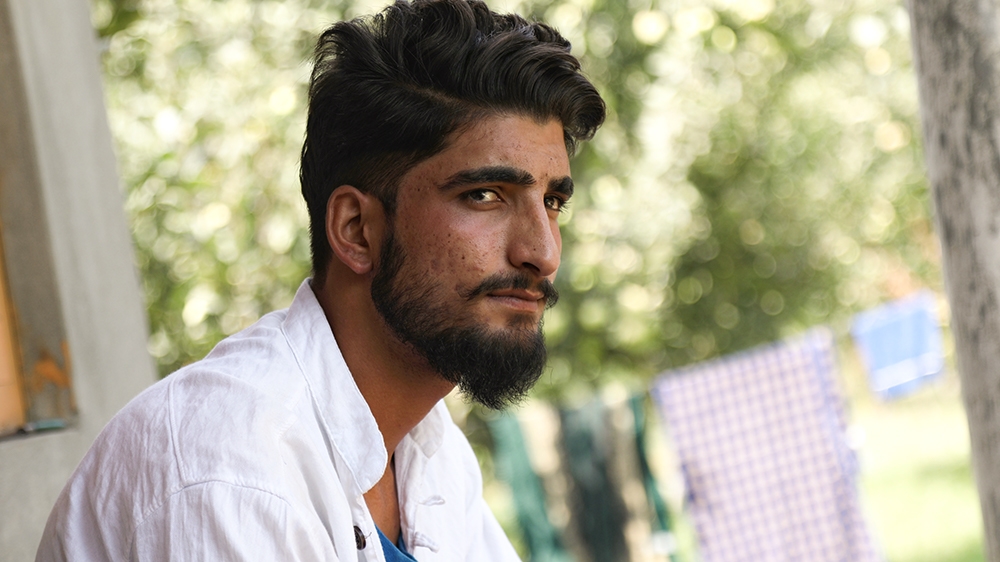
Dark life
At her home in Karimabad village in southern Pulwama district, Shaheena Akhtar, 37, has to nurse her two children: An 18-year-old daughter who is suffering from severe gastroenterology illness and her 20-year-old son who was hit with pellets on his right eye.
“This year has been the worst,” Akhtar told Al Jazeera. “We have been hit by a storm one after another.”
For most of her life, Akhtar has struggled with poverty. Her hope, however, was her elder son, Shariq Ahmad, whom she hoped would one day earn and support the family.
“I have only seen struggles in life. My hope was my son. He dropped out of studies three years ago when the situation in the family became difficult,” she said.
Shariq worked as a carpenter and earned a meagre amount of 5,000 rupees ($67) every month. It was just enough to support him and the family.
Last month, Shariq was hit by a burst of pellets fired during a protest near his village. He was partially blinded. One of the earning hands for the family suddenly found himself confined to his room.
The use of pellets to disperse protesters has widely been condemned as hundreds of people, most of them teenage boys, have been blinded by the shots of iron projectiles to ward off demonstrators in recent years.
“I don’t know whether to buy medicine for my kids, take them to the doctor or eat two meals,” she said. “My husband is daily-wage worker and he is also out of work for a year.”
“My son had his surgery last week but we were not able to get it done because it would cost 25,000 rupees ($334). This is an extra burden on us. It’s not only the wound on my son’s eyes, we are dead deep inside too, struggling for survival,” she said.
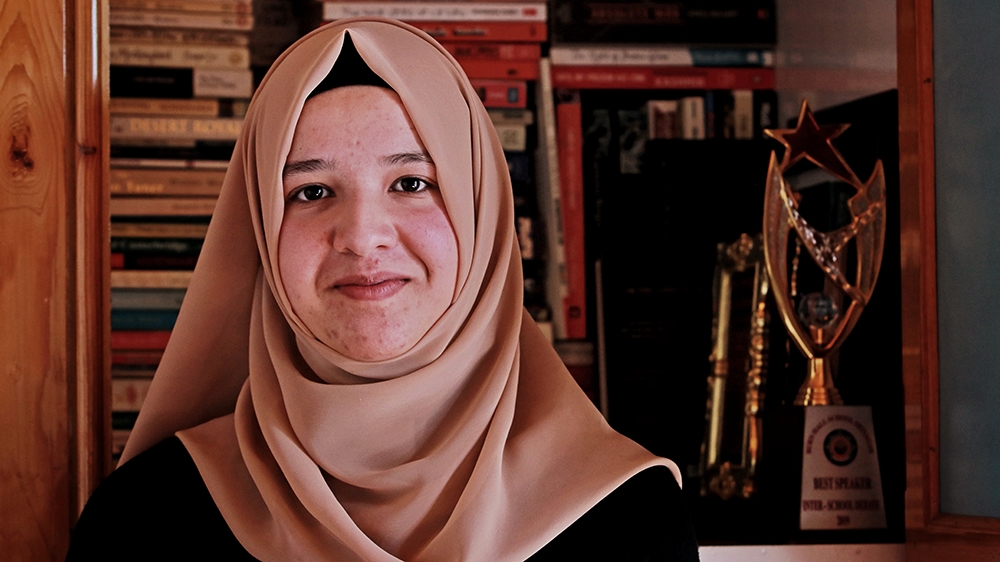
Shut schools
Asma Shakeel, 19, a resident of the main city of Srinagar, has a story of hope and an unending struggle. She says the situation in Kashmir “has made her tough and strengthened her will to move forward”.
She could not attend school in the wake of the lockdown announced last August while the internet blackout meant she struggled to continue her studies.
Kashmiri students could not attend classes after August 2019, making it one of the longest pauses for the region’s education sector and it has affected more than a million school-going students.
For months, she did self-study at home. When she would feel unable to concentrate due to the dire political situation, she says she would cry on a prayer mat.
“In Kashmir, what we see mostly is a shutdown after someone dies. And in such situations as a student it is hard to study at home,” said Shakeel who has an older brother and a twin sister.
She remembers her last day at the school before lockdown when she was busy with her friends discussing upcoming school events.
For months last year, Shakeel struggled to prepare for the exams and apply for scholarships in colleges outside India, which has always been her dream though her parents were against the decision.
In the absence of the internet and phones last year, Shakeel described it as the “hardest time”.
“My parents did not want me to apply for colleges outside. But I have been dreaming for it for years. I finally convinced them but the worst part during the communication blockade was that my teachers could not send me letters of recommendation,” she said.
“Applying for scholarships was difficult. I knew I could not even ask a penny from my father whose business has already suffered a lot,” she said, adding that she had to travel to the Indian capital New Delhi last year twice to apply for scholarships.
“I feared that my situation might keep me behind despite my hard work. I had made it a point last year to study day in and day out because I wanted to do it.”
Schools and colleges in Kashmir were turned into barracks for additionally deployed paramilitary forces.
While authorities asked schools to opt for online education during the coronavirus pandemic, the students had little chances as the high-speed internet remains banned due to “security reasons”.
The slow internet causes connectivity issues in e-learning and online classes, students say. According to the Private Schools Association in Kashmir only 20 percent of students in Kashmir who had fixed-line broadband at home could take “advantage of the online classes”.
“We can’t even study in the Zoom classes like students everywhere else. Our situation is not normal,” Shakeel said. “I had to work on my own at home and seek help from my school teachers.”
“We can’t watch educational videos. It’s extremely tough for students in Kashmir to stay without internet. In other places [outside Kashmir] at least students have access to high-speed internet and other facilities. They can order books online or could approach their teachers but for us everything has become very tough because of the place we come from,” she said.
Despite the hardships, Shakeel is a success story. She passed her high schools exam in July this year with flying colours. She secured 98 percent in her grade 12 exams and topped in Kashmir.
Her scholarship bid also turned out to be successful. She got a full scholarship to study at Georgetown University in Qatar.
“I am trying to get best out of this situation. We are denied many rights but need to give our best in this suffocating environment,” she told Al Jazeera.